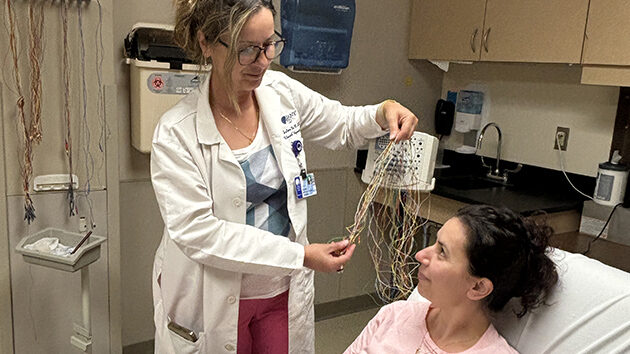Navigating Epilepsy: Unique Challenges for Women

Before becoming pregnant with her first daughter, Holly hadn’t had an epileptic seizure in more than a decade. But during her seventh month, she had a seizure—fortunately at home and with her husband nearby. Her blood work showed the level of epilepsy medication in her system to be low, so her dosage was increased.
Just weeks later, she had another episode, and blood work confirmed her medication level to be even lower than at the first visit.
“Medicines exit your system by being flushed out through the kidneys or processed through the liver, and the increased blood volume and estrogen during pregnancy can ramp up the process,” said Marjorie Bunch, MD, Director of the Epilepsy and Human Brain Mapping Program at Albany Medical Center, and neurologist currently overseeing Holly’s care. Without the right level of medication in a patient’s system, the patient is more likely to have a seizure.
During her second pregnancy, Holly had her blood checked weekly and her dose increased accordingly. She remained seizure-free for the duration.
Pregnancy is just one of the issues addressed by Dr. Bunch and her colleagues at Albany Medical Center’s Adult Comprehensive Epilepsy Program. The program is a member of the National Association of Epilepsy Centers, receiving a Level 4 designation, the highest recognition, indicating the program offers the most advanced medical and surgical diagnostic and treatment options for epilepsy. The System’s program is staffed by four epileptologists—neurologists who are board certified in epileptology. Patients can also access epileptic care at Glens Falls and Saratoga Hospitals.
Epilepsy is a common brain disorder that causes recurring, unprovoked seizures due to a brain injury, heredity, or in most cases, reasons unknown. Women with epilepsy face unique challenges as hormonal changes impact their health from puberty through menopause. Approximately half of women with epilepsy report an increase in seizures around their menstrual period. Other women experience their first seizures during menopause.
With more than 30 FDA-approved medications, the Epilepsy Program’s team works with patients to find the best option to become seizure-free. Dr. Bunch brings up pregnancy within the initial conversations she has with patients who could become pregnant: some anti-seizure medications can reduce the effectiveness of birth control, and some birth control methods can interfere with anti-seizure medications.
Antiseizure medication can also impact bone health. Women already have a higher risk of developing osteoporosis—and people with epilepsy are at higher risk for bone loss. Dr. Bunch said women with epilepsy are encouraged to ask their doctors about supplements to bolster bone health and the need for bone density scanning.
To help determine if seizures are due to epilepsy or another condition, patients undergo an electroencephalogram (EEG)— a painless test that measures brain waves at a given moment. Each year the Epilepsy Center team performs more than 2,000 EEGs and evaluates more than 400 patients in its inpatient epilepsy monitoring unit.
This in-hospital testing records seizures over a few days to determine if seizures are due to epilepsy or another condition, and to identify the specific brain region causing seizures in those who may benefit from surgery.
Medication is the most common form of therapy for epilepsy, however when medicine is not effective, Albany Medical Center’s Department of Neurosurgery offers high-level surgical options, including implanting nerve, neuro, or deep brain stimulators and ablation therapy.
Holly considers herself lucky. Her seizures—caused by an accident at 17—have not been a regular occurrence and medication has kept them controlled.
“Women with epilepsy need to take extra care of themselves and stay on top of their health, and I’m grateful for my team that keeps me healthy,” she said.